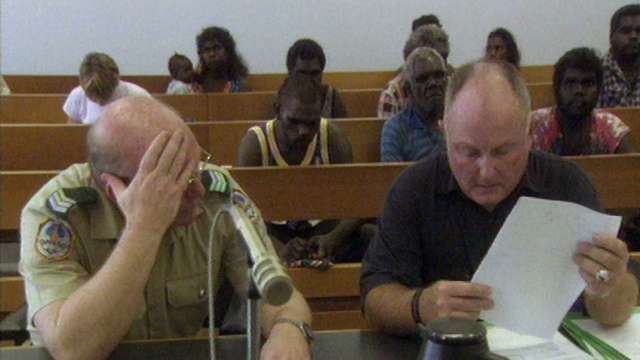Go to Jail
We investigate accusations that the Australian judicial system is totally biased against Aborigines.
 It was a high-profile and tragic death when a few months before this report, a 15 year old Aborigine boy hanged himself in a juvenile detention centre. The death of this youth sparked an international backlash, as the Northern Territory's laws on mandatory sentencing of Aborigines came under harsh scrutiny. And the relationship between Aborigines and white Australians became even more strained than before, spawning rumours of plans to sabotage the Sydney Olympics.
It was a high-profile and tragic death when a few months before this report, a 15 year old Aborigine boy hanged himself in a juvenile detention centre. The death of this youth sparked an international backlash, as the Northern Territory's laws on mandatory sentencing of Aborigines came under harsh scrutiny. And the relationship between Aborigines and white Australians became even more strained than before, spawning rumours of plans to sabotage the Sydney Olympics.
This is the story of what happened to that young boy, and what many young Aboringine males jailed for minor offences go through. Accused of stealing texts, paper, and paints from a school, the boy was arrested. It was his second offence. We speak to the lawyer who first interviewed him. " I remember him being physically small-a little kid, shy, giggly, difficult to get instructions from, difficult to talk to." The boy was not seen as a serious threat to society, and simply needed to be taught a lesson.
But the boy's sentence was much harsher than many think necessary. He was sent to a juvenile detention centre in Darwin for 28 days, where he became very depressed and moody. He wasn't a particularly bad child, the director of the centre Steve Parker says. But one day, after being sent to his room for mouthing off, the guards found him minutes later hanging by his own bedsheet.
The death prompted the suspicion that the Northern Territory may be in breach of the U.N. Conventions on the Rights of the Child. Just a month after, a bill was introduced in the House of Representatives to change the laws that were indirectly responsible for this boy's death. It was quickly crushed. And several plans to improve relations between Aborigines and non-indigenous Australians, including proposed treaties and pleas to the U.N., have all failed.
Adding to the controversy of the mandatory sentencing, Aborigines face another problem. This boy's crimes were reported by his own community. In these cases, the Aboriginal community feels stuck between a rock and a hard place. If they do report crimes, they face the mandatory sentencing of a community member for a trivial matter. The families of the alleged offender feel slighted, often causing inter-family conflicts. But if they don't report it, the crime goes unpunished.
Lawyers for the Aborigine offenders express their frustration at the futility of the trials. Even though they may be 3rd time offenders, the fact that an Aborigine boy can be jailed for nicking a tin of biscuits is not easy to swallow. Yet both the Australian and local N.T. governments are unwilling to give. And those who see firsthand what happens to these kids are left with no recourse, as one mother whose son will soon be on trial tells us, "I wish they could change the law. Or throw the new law away. Wash it away, throw it in the ocean and make it drift away." There has been no successful action against these discriminatory laws. Is Australia seeing any progress in their black-white relations, or will inequality continue to divide the nation?
Produced by ABC Australia
FULL SYNOPSIS
